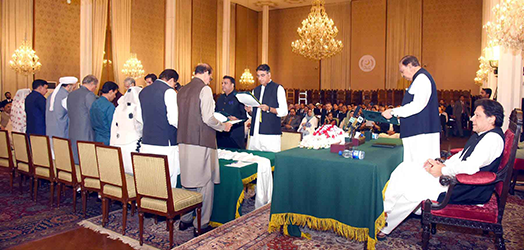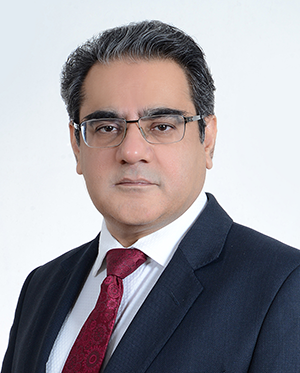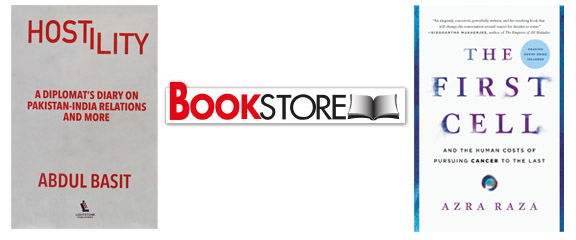How will Prime Minister Imran Khan and his beleaguered government fare in 2021? Will the ruling Pakistan Tehreek-e-Insaaf (PTI) succeed in raising its level of performance in the remaining days of its term or will it continue to flounder in the face of mounting internal and external challenges?
These are critical questions confronting Pakistan-watchers as the New Year sets in, and the Pakistan Democratic Movement (PDM) threatens to dislodge Khan from power.
Most political analysts are now convinced that the motley alliance of the PDM does not pose a threat to the Prime Minister. The myriad internal contradictions of the PDM, the clash of interests among its key component parties — the Pakistan Muslim League (Nawaz) and the Pakistan Peoples Party — and the fact that many of its frontline leaders are suffering from a credibility crisis will not allow the united opposition to take unified, practical steps. However, the opposition will remain an irritant for Imran Khan and his team in 2021, and the war of words between the two sides will continue to dominate televisions screens and the front pages of newspapers, as it did in 2020 and earlier. For Imran Khan, the make-or-break challenges will primarily be on the economic and governance fronts, where the perception of his government’s faltering performance remains strong, despite brave efforts by PTI’s army of ministers, advisors and assistants to build a counter-narrative. The pressure on the government to get its act together and deliver, is now increasingly being felt by the PM, who in his electioneering days had raised public expectations by promising to perform miracles once elected to power. Unfortunately, he has not been able to walk the talk because of both objective constraints and a series of choices he made since coming to power in August 2018.
Objectively speaking, the rot in the state of Pakistan proved to be much bigger and deeper than what Imran Khan and PTI’s think tank had estimated — a fact that is being now being openly admitted by the prime minister himself. Additionally, his slim parliamentary majority does not allow him to roll out the required reforms.

The PTI’s room to manoeuvre remains limited as it has to bank on its allies to stay afloat, especially in the Punjab which, by virtue of being the majority province of the country, holds the key to electoral power.
It is also a bitter fact that Imran Khan could not overhaul the system because he compromised and agreed to work within it, in his final bid for power. He had to bank on dynastic politicians, who had their constituencies and their tradition parliamentary seats —and who, unfortunately, were part of this or that government in the past. Even the class-composition of the PTI is now more or less the same as that of the PPP and the PML-N, thus preventing him from overhauling this entire decaying political edifice, which protects and promotes the interests of Pakistan’s elite. As the third and the newest political force in Pakistan’s power matrix, Imran Khan himself is probably the only difference between his party, the PTI, and its rivals.
His over-simplistic assertion that an honest man at the top would be able to run the government successfully and deliver under the parliamentary system has also been put to the test and proven wrong. Imran Khan’s integrity was not enough to perform the miracle of transforming Pakistan as his team, mostly comprising Pakistan’s tried-and-tested faces, failed to infuse new thinking and innovation in PTI’s style of governance.
In terms of foreign policy, more specifically its relations with its neighbours, the escalation of tensions with India in February 2019, when enemy aircraft breached Pakistan’s airspace, leading to retaliatory action from Islamabad — and then New Delhi’s August 5, 2019 decision to scrap the nominal autonomous status granted to occupied Kashmir, further exacerbated relations between the nuclear-armed South Asian rivals. These developments ran contrary to Imran Khan’s agenda of improving relations with its eastern neighbour. The Pakistani leadership totally misread Narendra Modi’s aggressive designs and the mood in New Delhi. As tensions with India intensified, Imran Khan’s reform agenda was further pushed to the backburner.

Some of Imran Khan’s subjective decisions were also questionable, including the appointment of the uncharismatic and inexperienced Usman Buzdar as the chief minister of Punjab. Buzdar’s abysmal record in Punjab, as compared to the impressive performance of the province’s former chief minister, Shehbaz Sharif, has drawn a lot of negative publicity for the PTI government.
It is also a fact that PTI’s own old guard mostly failed to impress in their respective portfolios, paving the way for hand-picked technocrats and political immigrants to capture many of the key decision-making posts.
Also, the PTI government’s decision to waste time on unimportant and frivolous acts in its initial days in power — from the much-hyped austerity drive to selling cars and buffalos — introduced an element of non-seriousness in the PTI’s approach, that continues to haunt the party to this day.
However, what has drawn the most flak from critics and political commentators is Imran Khan’s unyielding stance on the accountability drive against corrupt politicians which, they say, is the key factor behind the intensified political polarisation, confrontation and uncertainty in the country. Although the accountability drive has been a nominal success in terms of closure of corruption cases and conviction of the opposition’s big guns, it has at least kept the opposition leaders on the ropes.
Despite the drawbacks and challenges faced by the PTI government, one would not say that Imran Khan is down and out. In terms of personal credibility, charisma and popularity, he still remains head and shoulders above his corruption-tainted main rivals
There are, of course, those who support Imran Khan’s mission against corruption, which is being described as a cornerstone of PTI’s politics. But they maintain that while the government must fully back and financially support various accountability and crime-fighting arms of the government, including the National Accountability Bureau (NAB), Khan and his government should distance themselves from the process and ensure that it appears as impartial and even-handed as possible. In the bitter war of narratives perceptions matter, and can damage even a just cause, like bringing to justice those public-office holders, who plundered the national wealth and used their political clout to advance personal business and financial interests.
But despite the drawbacks and challenges faced by the PTI government, one would not say that Imran Khan is down and out. In terms of personal credibility, charisma and popularity, he still remains head and shoulders above his corruption-tainted main rivals — former premier Nawaz Sharif and former president Asif Ali Zardari. Even the next generation of these political dynasties — Maryam Nawaz and Bilawal Zardari — have a lot of ground to cover before they truly make their mark on the national scene.
Currently, PTI remains the only party which has penetration and a substantial following across Pakistan, and is nationalist in character — unlike the PML-N and the PPP, which are overwhelmingly Punjab and Sindh-centric respectively.
Imran Khan’s harmonious relations with the armed forces, and the fact that both the civilian and military leadership appear to have developed a consensus on most key issues, is an added advantage, which the erstwhile PML-N and PPP governments did not enjoy. Attempts by the PDM, especially Nawaz Sharif and his close associates, to malign the military leadership and drag the Pakistan Armed Forces into controversy, have backfired and further helped Imran Khan to consolidate and secure his position. However even Khan’s supporters agree that the PTI needs to up its game, improve governance in key areas and deliver on the economic front — and this must be done on a war-footing.
Post-March, Imran Khan’s position is likely to strengthen following the Senate elections, which will improve the numbers of the ruling alliance’s Senators in the upper house and give them a slim majority.
Post-March, Imran Khan’s position is likely to strengthen following the Senate elections, which will improve the numbers of the ruling alliance’s Senators in the upper house and give them a slim majority. This will allow the government to pass and enact laws, which it could not do in the first half of its term because of the higher numbers of the opposition senators.
The major opposition parties’ decision to participate in the Senate elections and by-polls on the national and provincial assembly seats, will further dilute PDM’s demand for the Prime Minister’s removal or fresh elections. In fact, political pundits even question the unity and effectiveness of the PDM itself, as Imran Khan appears poised to complete his five-year term.
Despite its tough posturing, the PPP has already shown that it wants a continuation of the present system. In 2021 and beyond, the PPP would be more focused on how to maintain its grip on Sindh in the next elections, and create some space for itself in Punjab and Khyber Pakhtunkhawa.
Nawaz Sharif’s tough talk notwithstanding, a strong faction within the PML-N as well does not want to upset the applecart and is trying for a compromise of sorts to remain in the game in the next elections. Maulana Fazlur Rehman is already facing the brunt of dissensions within his own party. He alone and the other smaller nationalist parties are in no position to launch any serious campaign to dislodge the current dispensation.
As for the sub-nationalists, the bitter fact remains that the pro-centre parties will continue to dominate both Khyber Pakhtunkhawa and Balochistan. In Balochistan, for instance, many of the JUI stalwarts wish to rethink their position as they would want to be part of any government which comes to power in the province.
As COVID-19 is likely to remain the new normal in the world for the next three to four years, Khan’s strategy appears to make sense, more and more.
So, in a nutshell, 2021 would be the most crucial and decisive year for the prime minister and his team, if they plan to remain serious contenders in the 2023 polls.
On the economic front, some of the key macro-economic numbers have started to improve. The government has taken a series of tough, belt-tightening measures in the first two years of its tenure under the International Monetary Fund programme. Now in the second-half of its term, it appears to be in a position to take some calculated risks to increase economic activity and growth. With slashed interest rates, a stable rupee, rising exports and remittances and improved domestic and foreign investments, the government is expecting an easing of economic pressure.
Imran Khan’s wager on the construction sector is also being seen as a step in the right direction. It will provide work to tens of thousands of unskilled and semi-skilled labourers and help the revival of several industries affiliated with the construction sector.
While Imran Khan may have lost the support of some of the urban middle and upper middle class voters, his initiatives in the social sector, including the health card scheme for all in Khyber Pakhtunkhawa, the shelter homes for the poor where they are also provided food, and the more than Rs. 200 billion Ehsaas Emergency Cash programme, under which Rs. 12,000 per family are being distributed among the daily wage-earners and low-income groups to mitigate the economic impact of COVID-19, have earned him a new following. The cash programme covers 15 million families — a huge number that has the potential of translating into votes going forward.
Imran Khan’s handling of the COVID-19 challenge has been acknowledged internationally, as he rejected the advice and pleas to slap a complete lockdown from certain quarters and instead, allowed partial economic activity. This prevented panic, unlike in many other countries, and allowed people to carry on with their daily lives.
As COVID-19 is likely to remain the new normal in the world for the next three to four years, Khan’s strategy appears to make sense, more and more.
Despite his vulnerability and his shortcomings, Imran Khan, has a fair chance of consolidating his power and further squeezing the space for his rivals, if he continues to stay at the crease, bats exceptionally well and delivers on the country’s scorecard. Those who are close to Imran Khan argue that his tenacity, his uncompromising nature and his fighting spirit are more of an asset than a liability. The captain has the potential to surprise all his opponents and give them a run for their ill-gotten money. Whether he will succeed in his mission, given the myriad obstacles in his path, remains a million-dollar question.




